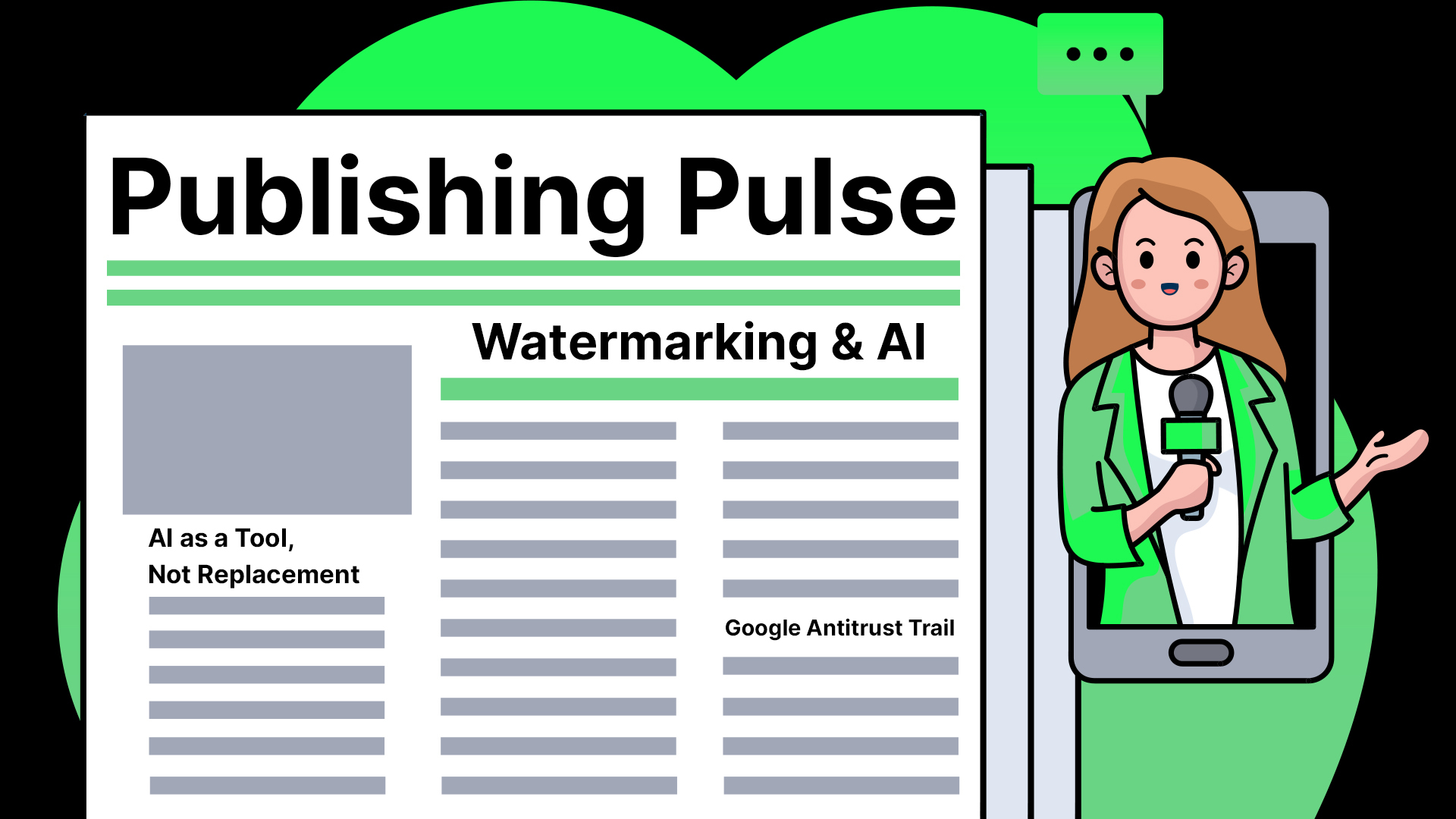Welcome to Publishing Pulse, your weekly source for industry updates in online publishing. Stay informed about the latest trends and breakthroughs in the ad ecosystem, content creation, SEO, and monetization.
If you prefer to listen to industry news, you can tune in to The Publisher Lab Podcast. New episodes are released weekly on Thursday.
Tech Giants Embrace Watermarking for Transparency and Safety of Gen AI Content
The surge in AI-generated content brings a pressing need for authenticity, as discussed in a recent article from Adweek. Watermarking emerges as a key solution to validate the origin and integrity of these AI-driven creations as the AI landscape evolves.
Watermarking technology is gaining traction among industry giants like OpenAI, Google, and Meta. These companies commit to enhancing transparency in AI-generated content by implementing invisible and embedded watermarks. Meta’s Instagram, for instance, is piloting notices to identify AI-altered content, providing users with additional context and transparency.

Watermarking transcends the scope of authenticity, extending its benefits to building trust and ensuring fair compensation. Through analyzing a content’s history, known as provenance, creators can instill audience trust and ensure proper credit allocation.
This approach safeguards creators’ intellectual property rights and fosters a healthier content ecosystem. However, the challenge lies in the effectiveness of watermarks, as visible and embedded ones can be easily manipulated.
AI as an Enabler: Enhancing, Not Replacing, Human Capacities
The Impact of Gen AI on Publisher Efficiency
Some forward-thinking publications are already leveraging Gen AI capabilities to revolutionize their back-end commercial processes.
According to Adweek, publishers like Politico, Raptive, Newsweek, and Bustle Digital Group are harnessing generative AI to streamline their internal revenue operations. The implementation of this technology has led to a surge in efficiency, resulting in improved margins, higher win rates, and enhanced business outcomes.
The newfound efficiency stems from the automation of various tasks that were once time-consuming and labor-intensive. These tasks include crafting responses to customer inquiries, composing job descriptions, and generating performance reviews.
However, the scope of generative AI’s impact extends well beyond administrative tasks. It also plays a pivotal role in summarizing complex market research data, conducting unit tests, and facilitating translations of coding languages. As a result, technical processes are being streamlined and optimized.

The success of these initiatives is being measured using a range of metrics, including project velocity, pre-sales timelines, and profit margins.
While the media landscape is currently characterized by a test-and-learn phase, the trajectory of AI’s role in the industry is clear. Media organizations are expected not only to acknowledge but also to adapt to the evolving role of AI within their operations.
Unveiling the Limits: How AI Falls Short in Replacing Genuine Client Connections
Amid concerns about AI’s potential to replace jobs, it’s crucial to reframe its role as a support system rather than a complete substitute within the marketing landscape. While AI has many efficiency pros, its limitations lie in comprehending complex human emotions and forging genuine connections, rendering human interaction indispensable for customer care and relationships.
The cornerstone of building trust and loyalty revolves around emotional connections, as discussed in a recent article on Search Engine Land. The nuances of human sentiments are where AI falls short. Creative thinking, another facet that remains a human forte, is an arena where AI encounters challenges; its inability to generate novel and unique ideas sets it apart from human ingenuity.
However, the judicious integration of AI tools holds immense promise for enhancing efficiency from CRM and chatbots to feedback analysis, predictive analytics, email marketing, and voice assistants. Yet, businesses must tread cautiously to find the right balance—AI should bolster efficiency without undermining the essence of human-centric customer interactions.
Updates on Google Antitrust Trial
In a pivotal development, the U.S. District Court for the District of Columbia has made critical decisions regarding the antitrust lawsuits filed against Google by the U.S. Department of Justice.
Accusing Google of anti-competitive practices that breach the Sherman Act, the lawsuits have triggered an extensive legal battle that could potentially reshape the digital advertising landscape and challenge Google’s dominance in search and online advertising.
According to reports from CNN and Search Engine Journal, the court’s focus remains firmly on Google’s distribution agreements, particularly those that establish its search engine as the default option on prominent platforms such as Apple’s Safari and Android devices.
While claims of Google disadvantaging specialty search sites were rejected, allegations regarding the manipulation of search advertising revenue through restrictive access to Android were upheld. This battle centers around Google’s exclusive contracts with web browser developers and Android device manufacturers, with the Department of Justice and state Attorneys General contending that these arrangements stifle fair competition.
On this week’s episode of The Publisher Lab podcast, our host Tyler Bishop dives into the new updates surrounding the antitrust trial.
“How many how many search engines are there out there? How many websites, how many different business ideas don’t exist? Because you essentially are competing with Google” says Tyler regarding Google’s anti-competitive practices, “I think that the decision-making behind many of these things is harmful to a lot of the potential new entries. But I find that most of the intentional behavior is very much aimed at 1 to 3 other companies.”

Set to commence on September 12, the trial marks a significant milestone in a series of legal challenges targeting Google’s immense economic influence.
The lawsuit questions whether Google’s dominance through deals with wireless carriers and device makers undermines competition. Notably, the court’s ruling could signal the Biden administration’s stance on antitrust issues.


